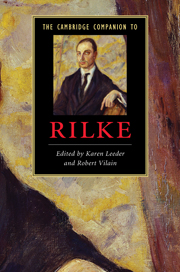6 - The Duino Elegies
from PART II - WORKS
Published online by Cambridge University Press: 28 July 2010
Summary
One of the most famous cycles of poems written in German in the twentieth century, and arguably one of the best known from any era, Rainer Maria Rilke's Duino Elegies (published in 1923) have remained remarkably influential into the twenty-first century. Translations into many languages are still being actively produced, with at least seven new translations into English alone since the turn of the millennium. Rilke's work has inspired not only major English-speaking writers such as American novelists Thomas Pynchon, British poet W. H. Auden, and American poet James Merrill but also writers from Iran (Sadegh Hedayat), the former Czechoslovakia (Milan Kundera), and India (Amitav Ghosh) - among many others. Composers such as Britain's Oliver Knussen, Russia's Dimitri Shostakovich, Denmark's Per Nørgård, Norway's Arne Nordheim and America's Morten Lauridsen have all set Rilke to music. Popular culture continues to absorb Rilke's writing and reproduces it in surprising venues ranging from self-help manuals to films to contemporary Indie rock groups. What is it about Rilke's work, and in particular the Duino Elegies, that fascinates so many readers? One answer might be that Rilke draws from a diverse cultural background. As a world traveller and lover of other traditions, Rilke is influenced by many cultures in addition to those of German-speaking countries: including, among others, Russia, where he travelled with Lou Andreas-Salomé, Scandinavia, where he stayed with Ellen Key, and France, whose poets, Baudelaire, Mallarmé and Valéry, he admired.
- Type
- Chapter
- Information
- The Cambridge Companion to Rilke , pp. 80 - 94Publisher: Cambridge University PressPrint publication year: 2010
- 1
- Cited by



